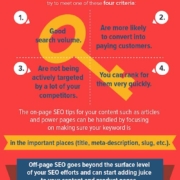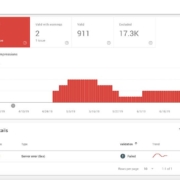The First Thing Your Customers Buy From You Isn’t Your Product
They buy your “communication product” first.
Look at any product description on any website. Peruse any brochure. You will find a list of features designed to tell you why the product will do the things you need it to do to solve your problem.
They will probably have a check mark next to them.
What you will not find on these lists are features like these:
- A helpful website so you make the right decision
- Informative reports and white papers offered free of charge
- An active Facebook page full of the opinions of our users
- A well-labeled box placed in the right part of the store so you can easily find it
How a product or service communicates is not considered an important feature. This is why marketers — who develop the communication features — struggle to keep their staff and budgets during a downturn. This is why Chief Marketing Officers (CMOs) don’t have a seat at the executive table with the CEO, President, COO and CFO.
To the executives, marketing doesn’t create products or sales. Marketing is a cost center.
Prospects actually become customers when they buy your communication products
The first purchase a prospect makes from your company is a communication product. It is the flyer, brochure, website, report, article, press announcement, blog post, webinar, etc. that you provide, ostensibly to help them understand how your product will help them solve a problem or entertain them.
They only occasionally pay with money. More often, they pay with their time, their attention, or with their contact information to continue the conversation. Since they don’t pay with money, marketing never shows up on the bottom line. It’s always seen as a cost.
Now, if a customer is satisfied with their “purchase,” they become a repeat customer taking more communication products. They also buy your company’s offering — for real money. Sales will get credit for the latter.
The mistake marketers make is creating communication products that are only focused on persuading prospects to buy the money-based products. How would things change if they focused on building great communication products instead?
The New Marketing Department
Imagine a marketing department run like a product development department. How would that change the focus?
| Marketing Department | Communications Products Department |
|---|---|
| Develops campaigns | Develops products that communicate (educate, inform and entertain) |
| Creates promotional content | Creates relevant, educational, or entertaining content |
| Targets product users | Targets influencers, approvers and gatekeepers as well as product users |
| Watches marketing metrics and buzz | Watches time spent with the “products,” customer satisfaction, repeat “buys” |
| Has a website | Provides online services to help prospects solve their problems |
| Creates a competitive matrix | Creates better communications products than competitors (who are stuck with a marketing department) |
| Prepares “messaging” and approved copy matrices | Discovers new ways to help their communications product customers |
| Stays “on brand” | Improves the brand with great communication experiences |
| Bases budgets on the cost of campaigns | Bases budgets on the feature set needed to win in the communications marketplace |
| Builds brand with frequency and relevance | Builds brand by frequently helping prospects find information they are looking for |
| Segments the marketplace and creates targeted messages for each segment | Creates buyer personas for their communication products, and then delivers the products that serve them |
This list could go on. What would you add? Tell us in the comments.
I’ll be talking about how buyer personas drive bigger marketing budgets at ProductCamp Austin on Saturday, August 15. Come out and let’s talk about great communications products.
Photo courtesy lusi
- How to Pick a Conversion Optimization Consultant for your Online Business - April 18, 2024
- Conversion Rate Optimization for SaaS Companies - March 25, 2024
- SaaS Website Best Practices for Conversion Optimization - March 25, 2024

















Leave a Reply
Want to join the discussion?Feel free to contribute!